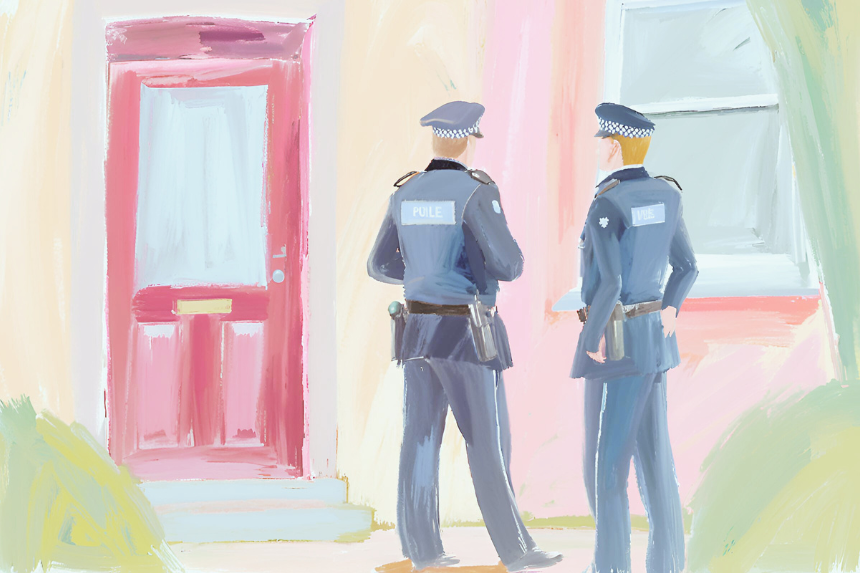What Is Happening?
Across the globe, there is a troubling trend emerging: law-abiding citizens are increasingly being targeted by police for expressing their opinions. These interventions often focus on “non-crime hate events”—incidents where no law has been broken, but someone perceives offense or harm from words or actions. Allison Pearson, a writer for the UK’s Daily Telegraph, was visited by the police on Sunday, November 10, 2024, following a year-long investigation prompted by a social media post.
🔴 @AllisonPearson reveals how police officers called at her home on Remembrance Sunday to tell her of inquiry into year-old social media post
— The Telegraph (@Telegraph) November 12, 2024
Find out more 👇https://t.co/S63MCOk6UJ pic.twitter.com/jM9q79zhzQ
From social media posts to casual remarks, individuals are finding themselves summoned by the police, questioned, and even threatened. This shift places a growing number of people under scrutiny for activities that were once firmly within the bounds of free expression. Worse still, it diverts police resources away from addressing real crimes, raising serious questions about the priorities of modern policing.
The statistics reflect the scale of this issue. In the United Kingdom alone, thousands of non-crime hate incidents have been recorded annually, with the police treating subjective feelings of offense as actionable matters. This disturbing trend undermines the police’s core mission: to protect citizens from actual threats, not police their thoughts or words.
Why Is This Happening?
This shift did not occur overnight. For decades, activist groups—often rooted in leftist ideologies—have worked to reshape societal norms by targeting institutions like the police. Their efforts aim to enforce ideological conformity, using the language of harm and safety to justify restrictions on speech. There has been a long march through the forces that Antionio Gramsci would be well-pleased with.
The underlying premise is that words can cause as much harm as physical violence. While no one condones hateful or harmful rhetoric, equating speech with criminal acts sets a dangerous precedent. It turns police officers into arbiters of subjective offense rather than impartial enforcers of the law.
Organisations promoting these ideologies have systematically lobbied for laws and policies that blur the line between offensive language and criminal behaviour. This is part of a broader strategy to control discourse by criminalising dissenting opinions. Such tactics often target those who do not align with progressive ideals, branding them as hateful or dangerous regardless of their actual intent.
The ultimate goal of these efforts is not public safety but ideological dominance. By enlisting the police to enforce these norms, activist groups can suppress opposition and silence those who question their worldview. At the very heart of these efforts is a strong will to replace the Judeo-Christian worldview upon which the West has enjoyed much freedom and prosperity with their worldview
Radicalisation of Police Forces
Police forces, once seen as impartial protectors of the public, are now at risk of becoming ideological enforcers. This radicalisation is not accidental but a direct result of sustained pressure to align with specific secular ideologies.
Traditionally, policing has been guided by principles of neutrality and service to all members of the community. However, the focus has shifted toward advancing social agendas at the expense of public trust. Officers are increasingly tasked with monitoring speech and behaviours that offend specific groups, creating an environment of fear and suspicion.
This shift represents a profound digression from the police’s original remit. Instead of addressing tangible threats like violence, theft, or exploitation, resources are being squandered on monitoring social media or issuing warnings over perceived slights. This not only undermines public confidence but also leaves communities vulnerable to real crimes that go unaddressed.
What Can We Do About It?
The spread of secular liberal ideologies, with their roots in Marxist thought, relies heavily on fear and intimidation to suppress opposition. Challenging this requires collective courage and a commitment to defending free expression.
First, individuals must refuse to be silenced. When confronted with police overreach, citizens should assert their rights and demand accountability. Publicising these encounters can highlight the absurdity of policing non-crime events, exposing them to wider scrutiny and criticism.
Thankfully, the bravery displayed by Allison Pearson to go fully public with her incident, was rewarded last week when Essex Police dropped the case against her. This is a victory for common sense that we applaud.
🔴 JUST IN: Essex Police has dropped its investigation into Allison Pearson, the Telegraph journalist
— The Telegraph (@Telegraph) November 21, 2024
Find out more 👇https://t.co/5XyZOKziaC pic.twitter.com/5ObYxy7GU2
Second, it is essential to build coalitions that champion free speech and civil liberties. Organisations that advocate for these values must continue to hold the police and policymakers accountable for overstepping their bounds. By applying pressure through legal challenges, public campaigns, and media advocacy, these groups can push back against the erosion of fundamental rights.
Finally, society as a whole must reassert the importance of free speech as a cornerstone of democracy. This includes rejecting the notion that offense is equivalent to harm and recognising the value of diverse viewpoints, even those we disagree with. Without a robust defence of free expression, the creeping authoritarianism of ideological policing will only grow stronger.
Conclusion
The rise of non-crime hate event surveillance represents a dangerous shift in police priorities. By prioritising subjective feelings over actual crimes, police forces are abandoning their duty to protect the public and succumbing to ideological pressures.
This trend is not inevitable. By speaking out against overreach, supporting civil liberties, and demanding accountability, citizens can resist the radicalisation of policing. The stakes are high: the survival of free speech and the integrity of law enforcement depend on our ability to challenge these developments and reclaim the values of fairness and impartiality that underpin democratic societies.


